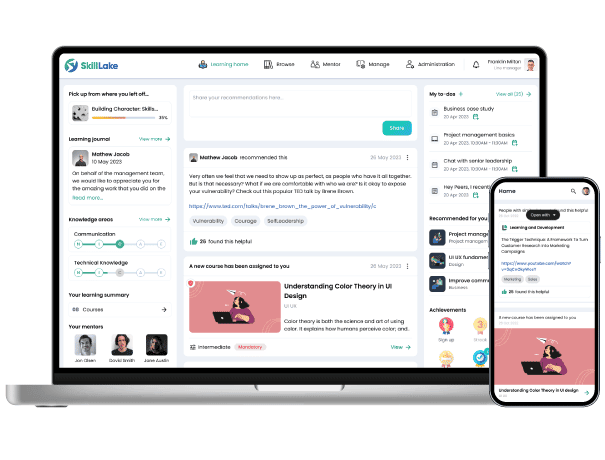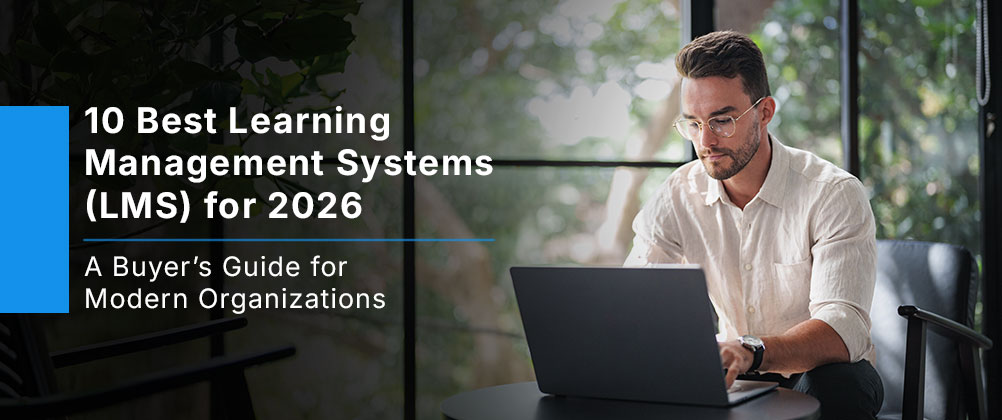Performance Management in HR 2024 [Guide]

Statistics revealed that 98% of organizations believed performance management was necessary for success. Furthermore, 80% of employees preferred immediate feedback rather than waiting for annual performance management reviews. These statistics highlight the importance of performance management and the changing preferences of employees, who now prefer real-time feedback. Organizations understood that performance management was vital in ensuring employees’ work aligned with corporate goals.
In this blog, we will discuss:
- What is performance management in HR?
- Why is performance management critical?
- The performance management process
- How do we manage poor performance in the workplace?
- How do we measure performance management?
- How to implement performance management software?
What is Performance Management in HR?
Performance management in HR is the strategy that monitors and manages employees, creating an environment where people can perform at their best. It helps HR professionals or managers understand where employees stand regarding goals and capabilities.
Why Is Performance Management Important?
Performance management has a significant role in the success of an organization. It helps to identify employee issues, strengths, and weaknesses and take proactive steps for growth.
In 2023, 79% of HR managers in the retail sector and 83% in the financial industry believed moving forward required a focus on performance management and continuous employee feedback exchanges.
Performance management in HR brings in numerous benefits like:
- Continuous performance monitoring allows the HR department to identify potential issues before they escalate.
- Identifying performance issues enables the HR team to create targeted training programs to improve skills and processes.
- Performance management clarifies employee roles, expectations, and reporting structures, boosting productivity and confidence.
- Effective performance management provides a platform for employees to share concerns and ideas, promoting communication and making employees feel valued.
- Engaged employees are more productive and committed to their work. Performance management can enhance engagement by fostering a sense of investment in the company.
- The implementation of meaningful recognition and reward systems increases employee motivation and satisfaction. According to a survey by American Express, a third of top businesses believe that recognition and reward lead to higher staff retention.
- Performance management aligns employees with organizational goals, enhancing their understanding of how their contributions affect the company’s success.
Let us look into the statistics discussing the impact of continuous feedback:
- Companies adopting continuous performance feedback significantly outperformed competition at a 24% higher rate. (Betterworks, 2020)
- Organizations with continuous performance processes are 39% better at attracting top talent, and 44% better at retaining talent. (Betterworks, 2020)
- In organizations with a continuous performance process, HR teams enjoy a 50% increase in their ratings by managers as “excellent”. (Betterworks, 2020)
- Some areas where companies with continuous performance management outperform traditional ones have increased productivity (66%), motivating the entire workforce (65%), and achieving the top goals of the organization (64%). (Betterworks, 2020)
- 72% of respondents thought their performance would improve if their managers provided corrective feedback. (Hbr.org, 2014)
- According to 86% of employees and executives, poor collaboration and inefficient communication are the main reasons for workplace failures. (Clearcompany, 2017)
- Companies and organizations with greater-than-average levels of employee engagement reported 27% higher earnings and 38% higher productivity. (Hiredna, 2020)
The Process of Performance Management
Performance management is a continuous process that involves setting objectives, establishing evaluation criteria, and managing outcomes.
1. The planning phase
The performance review process typically begins with the planning phase. Ensuring that the performance appraisal or review is conducted effectively and aligns with the organization’s goals and objectives is crucial. The planning phase sets the stage for a successful performance review process by establishing clear expectations, guidelines, and goals, ensuring that the process is fair, objective, and focused on improving employee performance and contributing to organizational success.
2. Reviewing phase
The reviewing phase is an opportunity to assess the employee’s performance during the review period. Self-assessment is a common component of this process, allowing employees to evaluate their performance against the provided guidelines. Managers should also assess work accomplishments in alignment with goals, document any challenges faced, and discuss unforeseen barriers that may have arisen.
3. Coaching phase
The coaching phase is designed to help employees contribute positively to the organization. During this phase, the employee and manager should meet regularly to review progress toward performance goals and determine if additional support or resources are needed to help the employee achieve these objectives.
How Do You Manage Poor Performance In The Workplace?
Here is a checklist to assist the HR team in effectively tackling poor performance issues.
- Developing criteria to assess employees’ performance, including their strengths and weaknesses.
- Address poor performance promptly by initiating one-on-one discussions.
- Maintain records of all performance-related conversations and subsequent actions for continual improvement.
- Engage in a two-way dialogue by asking employees about their challenges and perspectives.
- Acknowledging employees’ strengths and offering positive feedback to foster trust.
Develop a performance improvement plan outlining clear goals and expectations.
How Do We Measure Performance Management?
The HR team can employ specific Key Performance Indicators (KPIs) and a systematic measurement process to assess performance management precisely. Below are five crucial KPIs accompanied by their respective measurement processes:
| KPI | Definition | Measurement Process |
| Employee Engagement Score | Measures employee engagement with work, colleagues, and the organization. |
1. Administer regular employee engagement surveys (e.g., quarterly or annually). 2. Calculate the average engagement score based on survey responses. 3. Analyze trends over time. |
| Goal Achievement Rate(GAR) | Indicates the percentage of employees meeting or exceeding performance goals. |
1. Review individual and team performance against set goals. 2. Calculate the percentage of employees achieving their goals. 3. Compare GAR over different performance periods. |
| Feedback Effectiveness | Assesses how well feedback is delivered and received within the organization. |
1. Conduct feedback effectiveness surveys or interviews. 2. Analyze feedback processes, including timeliness, specificity, and receptivity. 3. Calculate an FE score based on results. |
| Employee Turnover Rate | Measures the percentage of employees leaving the organization within a specified period. |
1. Gather data on employee departures during a given time frame. 2. Calculate ETR by dividing departures by the average number of employees. 3. Analyze turnover trends. |
| Managerial Adherence Score(MAS) | Evaluates how consistently managers follow performance management processes. |
1. Conduct manager assessments or audits based on established criteria. 2. Evaluate adherence to processes like goal setting, feedback, and appraisals. 3. Calculate a MAS. |
How to Implement Performance Management Software?
Performance management software is an exemplary tool that simplifies the process and elevates workforce management effectiveness. For companies aiming to actively engage their employees and foster an environment of growth, online learning platforms like Skill Lake offer a revolutionary approach. These platforms, which can operate on private servers or cloud-based systems enhance performance management by achieving unprecedented efficiency and integration.
- Investigate and choose a performance management software provider that meets your organization’s requirements and budgetary constraints.
- Ascertain the necessary funds for the software acquisition, implementation, and maintenance. Remember to allocate resources for comprehensive training and support.
- Collaborate with your chosen vendor to tailor the software, ensuring it complements your organization’s established performance management procedures and workflows.
- Plan meticulously for data transfer, especially if you’re shifting from manual methods or outdated systems, guaranteeing historical performance records are precisely migrated.
- Ensure the new software aligns with other pertinent HR and organizational systems, such as your HRIS or payroll applications, for streamlined operations.
- Organize detailed training programs for HR staff, managers, and other employees to maximize the software’s utility.
- Initiate the software implementation on a smaller scale or among a particular user group to evaluate its functionality and gather feedback.
- Regularly oversee the software and assess its influence on performance management procedures, adjusting as necessary.
- Exploit the software’s analytics and reporting capabilities to derive valuable insights into employee performance, facilitating informed decision-making.
- Enact robust security protocols to safeguard confidential employee information.
- Maintain a support system for users, resolving any emerging questions or issues without delay.
What Makes Skill Lake An Apt Performance Management Software
Learning management systems (LMS) are pivotal in facilitating online training in today’s rapidly changing digital landscape. A top-notch corporate LMS enables the workforce to stay aligned with the ever-evolving business world demands. It empowers organizations to assess employees’ competencies, identify skill gaps, and tailor corporate training programs to enhance their skills. Skill Lake emerges as a versatile and adaptable solution for organizations looking to foster a culture of continuous learning and skill enhancement. With its AI-driven personalized learning, competency management, accountability features, SCORM compliance, and robust user management capabilities, Skill Lake is well-equipped to support the workforce’s growth and development, ultimately driving success in a dynamic digital world.

Build a culture of continuous learning with Skill Lake’s state-of-the-art people development platform. Give your employees professional training to help them excel in their job roles and propel your business to greater efficiency and success.
Start Today

Sachin Krishna
Sachin is a passionate advocate of e-learning with a profound knowledge of the field. He regularly writes compelling content that captivates readers and works to spread awareness of learning solutions.